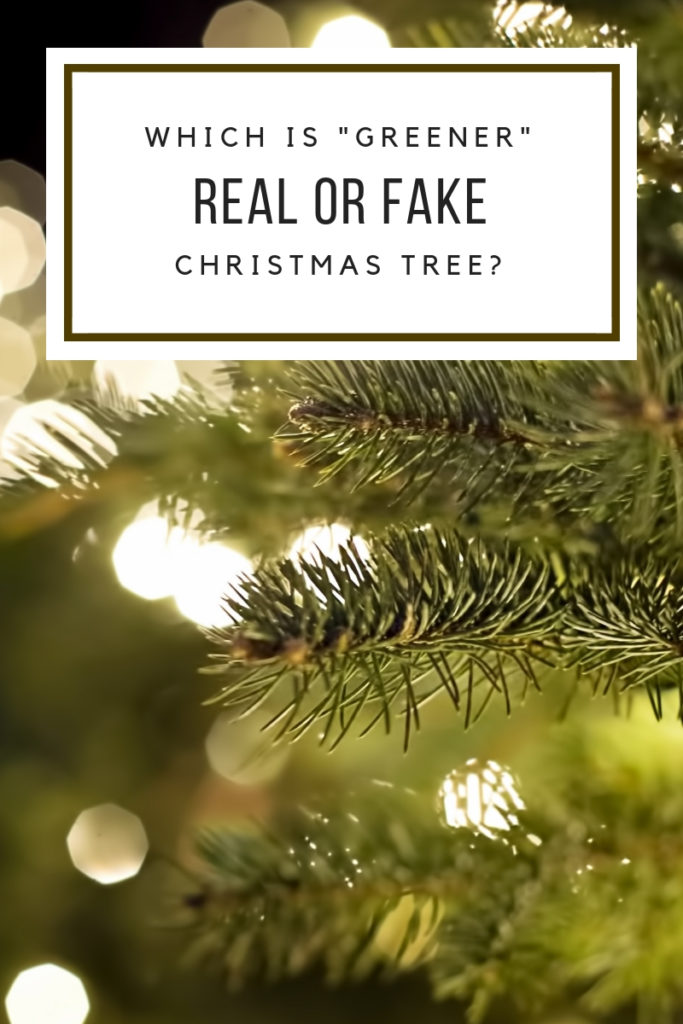Maybe you’re in the market for a Christmas tree and want to make an earth friendly choice. But which is the greener option? A fake tree that lasts a long time? Or a real, living tree that will last only one Christmas?

Are Artificial Christmas Trees Earth-Friendly?
Pro: Fake trees last forever! Con: Fake Trees last forever. Think of how many real trees we are saving from being chopped down when we purchase a fake tree right? Well – not so fast. Typically made from plastic and similar petroleum based products, fake trees will not biodegrade at the end of their lives. We also want to consider the energy and resources it takes to manufacture them, waste to package them, and fuel to ship them from overseas. Taking into account all of those factors, buying a new artificial or “fake” tree is not an earth-friendly option.
However they do have that one upside – They last a long time. If you already have an artificial tree, the greener choice is to continue using it for as long as you can. Once it’s time to get rid of it, donate it or sell it locally. You might also like to consider re-purposing it into wreaths, garlands, or other decorations.
If you’re going to buy an artificial tree, buy or find a used one. Many people donate or sell their perfectly good trees when they move or downsize. Buying used will give that tree a second life. You can check Craigslist, thrift shops, or social media marketplaces for a previously-loved tree.
Are Real Christmas Trees a Better Alternative?
Sure, a fresh cut tree only lasts one season. However it is still usually a greener option when you purchase a tree that was planted just to become a Christmas tree
- Often, for every one tree cut down in a Christmas tree farm, 1 – 3 trees are usually planted in it’s place to maintain stock for future years.
- Throughout the year while the trees are growing, they produce oxygen and remove CO2 from the atmosphere. They also provide homes for birds and other wildlife.
- Christmas trees are often grown on land not suitable for other crops. Christmas tree farms can be found close to heavily populated areas where the demand for these trees is high. If the farms weren’t there, this land might otherwise be built on rather than used for farming.
- Purchasing from a local Christmas tree farm supports your local business. If you don’t have to drive far to get the tree, it creates a smaller carbon footprint.
- Avoid buying from a big box store that ships trees in from far away, or places that sell trees cut from otherwise healthy forests.
End of life: The good news is that once you throw your real tree out, it is completely biodegradable. You can even consider using it for firewood or donating it to be used as mulch or in compost. Check around to see what types of options are available locally.
Consider a Christmas Tree Alternative
A living potted tree: All of the benefits of a real tree and it wont die at the end of the season! It can be kept in a pot year round. Transfer to bigger pots as it grows and eventually it can be replanted if you have the space in your yard. You could even make it an annual tradition to plant a new tree each year. This is most likely your greenest option 🙂
A climate-appropriate tree: No yard or wrong climate to plant a Christmas tree? How about a plant that grows naturally in your area? Or maybe a unique house plant you can decorate or have year-round.
A sustainable artificial tree alternative: If you’re crafty, you can re-purpose old items to make a “tree” out of anything. If you’re not, you may just be able to find a local artist who does. We’ve seen “trees” made of wire coat hangers wrapped in garland, old boxes decorated and stacked to look like a tree, wooden pallets for a rustic look, and more.
The Conclusion Real Tree or Fake Tree?
Buying a living potted tree or other plant is likely your most earth friendly option. If you already have a fake tree, use it for as long as possible. Otherwise, buying a live cut tree can be quite earth friendly. Avoid buying a new artificial tree. If you are going to buy a fake tree buy it used, or consider a recycled or repurposed alternative.
Did you find this article helpful? If you would like to help support this blog, please consider doing some of your holiday shopping at ecogirlshop.com
XOXO,
Eco Girl


